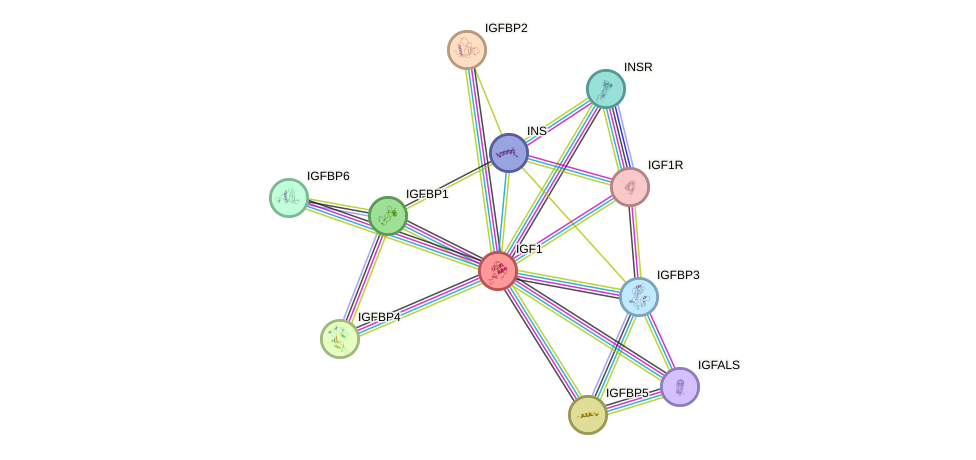GenAge entry for IGF1 (Homo sapiens)
Gene name (HAGRID: 28)
- HGNC symbol
- IGF1
- Aliases
- IGF1A; IGFI; IGF-I
- Common name
- insulin-like growth factor 1 (somatomedin C)
Potential relevance to the human ageing process
- Main reason for selection
- Entry selected based on evidence linking the gene product to a pathway or mechanism linked to ageing
- Description
IGF1 is a hormone that stimulates growth and mediates many of the actions of GH1. Like GH1, its circulating levels decline with age in humans. The GH1/IGFI axis is considered a possible player in the ageing process of several model organisms, including rodents [286] .
IGF1 null mice show growth deficiency and usually are not viable, though some can reach adulthood [965]. Mutations that lower IGF1 levels in mice retard growth and extend lifespan [287], even if a definitive causative relation between IGF1 and ageing has not been demonstrated. In another study, including three different mice cohorts, it was reported that IGF1-deficient mutants, producing reduced levels of IGF1, display an increase in maximum lifespan, but not in the mean lifespan [3528]. Cardiac specific overexpression of IGF1 results in a 23% increase in median lifespan, though no increase in maximum lifespan [1902]. IGF1 signalling appears to integrate nutrient and temperature homeostasis in mice [4502]. Contrastly, congenital liver IGF1-deficient male mice, have a reduced lifespan (by ~20%). Inducing hypertension in these mice leads to cerebral microhaemorrhages which mimic the ageing phenotype [4501]. Additionally, inducibly deleting the liver IGF1 gene at one year of age impairs health span. The mice display compromised skeletal integrity, decreased body, kidney and quadriceps weight, and an increase in liver weight, inflammation, oxidative stress and tumors [3556].
In humans, IGF1 levels have been associated with several pathologies. High levels of IGF1 have been found to be associated with risk of breast cancer [993]. On the other hand, low levels of IGF1 have been associated with osteoporosis [1923]. Genotype combinations in the human PIK3CB and IGF1R genes have been related to plasma IGF1 levels and longevity [141]. Low levels of IGF-1 in nonagenarians females (but not males), and both males and females with a history of cancer, predicts longer survival chances [3599]. Despite being a putative regulator of ageing, IGF1's exact influence on human ageing is not known.
Cytogenetic information
- Cytogenetic band
- 12q23.2
- Location
- 102,395,867 bp to 102,480,645 bp
- Orientation
- Minus strand
Protein information
- Gene Ontology
-
Process: GO:0000187; activation of MAPK activity
GO:0001501; skeletal system development
GO:0001775; cell activation
GO:0002576; platelet degranulation
GO:0006260; DNA replication
GO:0006928; movement of cell or subcellular component
GO:0007165; signal transduction
GO:0007265; Ras protein signal transduction
GO:0007517; muscle organ development
GO:0008283; cell proliferation
GO:0008284; positive regulation of cell proliferation
GO:0009408; response to heat
GO:0009441; glycolate metabolic process
GO:0010468; regulation of gene expression
GO:0010560; positive regulation of glycoprotein biosynthetic process
GO:0010613; positive regulation of cardiac muscle hypertrophy
GO:0014065; phosphatidylinositol 3-kinase signaling
GO:0014068; positive regulation of phosphatidylinositol 3-kinase signaling
GO:0014834; skeletal muscle satellite cell maintenance involved in skeletal muscle regeneration
GO:0014896; muscle hypertrophy
GO:0014904; myotube cell development
GO:0014911; positive regulation of smooth muscle cell migration
GO:0030166; proteoglycan biosynthetic process
GO:0030335; positive regulation of cell migration
GO:0032148; activation of protein kinase B activity
GO:0033160; positive regulation of protein import into nucleus, translocation
GO:0034392; negative regulation of smooth muscle cell apoptotic process
GO:0035630; bone mineralization involved in bone maturation
GO:0040014; regulation of multicellular organism growth
GO:0042104; positive regulation of activated T cell proliferation
GO:0042523; positive regulation of tyrosine phosphorylation of Stat5 protein
GO:0043066; negative regulation of apoptotic process
GO:0043388; positive regulation of DNA binding
GO:0043410; positive regulation of MAPK cascade
GO:0043491; protein kinase B signaling
GO:0043568; positive regulation of insulin-like growth factor receptor signaling pathway
GO:0044267; cellular protein metabolic process
GO:0045445; myoblast differentiation
GO:0045669; positive regulation of osteoblast differentiation
GO:0045725; positive regulation of glycogen biosynthetic process
GO:0045740; positive regulation of DNA replication
GO:0045821; positive regulation of glycolytic process
GO:0045840; positive regulation of mitotic nuclear division
GO:0045893; positive regulation of transcription, DNA-templated
GO:0045944; positive regulation of transcription from RNA polymerase II promoter
GO:0046326; positive regulation of glucose import
GO:0046579; positive regulation of Ras protein signal transduction
GO:0048009; insulin-like growth factor receptor signaling pathway
GO:0048015; phosphatidylinositol-mediated signaling
GO:0048146; positive regulation of fibroblast proliferation
GO:0048661; positive regulation of smooth muscle cell proliferation
GO:0050679; positive regulation of epithelial cell proliferation
GO:0050714; positive regulation of protein secretion
GO:0050731; positive regulation of peptidyl-tyrosine phosphorylation
GO:0050821; protein stabilization
GO:0051450; myoblast proliferation
GO:0060283; negative regulation of oocyte development
GO:0061051; positive regulation of cell growth involved in cardiac muscle cell development
GO:0070371; ERK1 and ERK2 cascade
GO:0070886; positive regulation of calcineurin-NFAT signaling cascade
GO:0090201; negative regulation of release of cytochrome c from mitochondria
GO:1904075; positive regulation of trophectodermal cell proliferation
GO:2000679; positive regulation of transcription regulatory region DNA binding
GO:2001237; negative regulation of extrinsic apoptotic signaling pathway
Cellular component: GO:0005576; extracellular region
GO:0005615; extracellular space
GO:0005886; plasma membrane
GO:0016942; insulin-like growth factor binding protein complex
GO:0031093; platelet alpha granule lumen
GO:0035867; alphav-beta3 integrin-IGF-1-IGF1R complex
GO:0042567; insulin-like growth factor ternary complex
GO:0070382; exocytic vesicle
Hide GO termsFunction: GO:0005158; insulin receptor binding
GO:0005159; insulin-like growth factor receptor binding
GO:0005178; integrin binding
GO:0005179; hormone activity
GO:0005515; protein binding
GO:0008083; growth factor activity
Protein interactions and network
- Protein-protein interacting partners in GenAge
- IGF1R, E2F1, IGFBP3, IGFBP2
- STRING interaction network
Retrieve sequences for IGF1
Homologs in model organisms
In other databases
- GenAge model organism genes
- A homolog of this gene for Mus musculus is present as Igf1
- GenAge microarray genes
- This gene is present as IGF1
- LongevityMap
- This gene is present as IGF1

